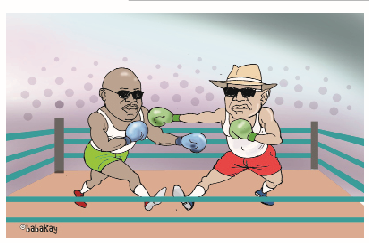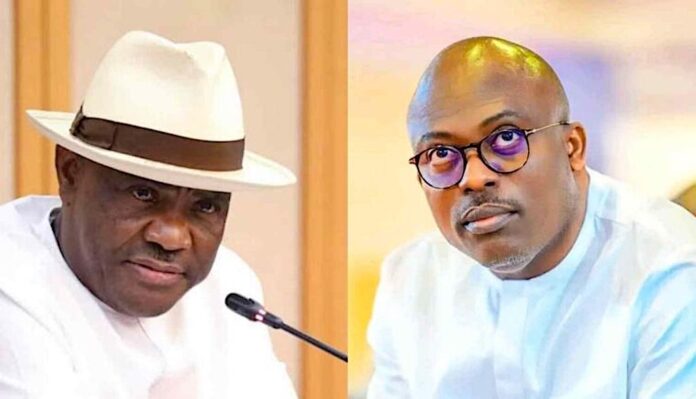The political scene in Rivers State, Nigeria, has been buzzing with a heated conflict between Governor Siminalayi Fubara and his predecessor, Nyesom Wike. This clash of titans has not only caught the attention of the locals but has also garnered significant interest from national and international observers. We must dig deep into the political dynamics and personalities to understand what’s going on.
 Governor Siminalayi Fubara, who took office in May 2023, was seen as a protege of Nyesom Wike, the former governor of Rivers State. Wike, a big shot in the People’s Democratic Party (PDP), played a key role in Fubara’s rise to power. At first, it seemed like Fubara would follow in Wike’s footsteps, carrying on his legacy and policies, ensuring a smooth transition. However, tensions began to rise as Fubara started asserting his authority and making independent decisions.
Governor Siminalayi Fubara, who took office in May 2023, was seen as a protege of Nyesom Wike, the former governor of Rivers State. Wike, a big shot in the People’s Democratic Party (PDP), played a key role in Fubara’s rise to power. At first, it seemed like Fubara would follow in Wike’s footsteps, carrying on his legacy and policies, ensuring a smooth transition. However, tensions began to rise as Fubara started asserting his authority and making independent decisions.
One major source of tension stems from Fubara’s desire to establish his own identity and administration, separate from Wike’s influence. As a new governor, Fubara wants to show that he can lead on his terms without being seen as a puppet of his predecessor. This quest for independence has naturally caused friction with Wike, who is known for his strong personality and influence within the PDP.
While both leaders belong to the same political party, policy priorities and governing style differences have come to the surface. Fubara has introduced new initiatives and made appointments that don’t always align with Wike’s preferences. This divergence in policy direction has further strained their relationship.
Managing and allocating the state’s resources have also become a major bone of contention. Rivers State, one of Nigeria’s oil-rich states, rakes in significant revenue from oil. How to distribute and use these funds has been a major sticking point, with both leaders vying for control.
So, there you have it. The political landscape in Rivers State is currently a battleground between Governor Siminalayi Fubara and his predecessor, Nyesom Wike. Their clash of interests and ambitions has created quite a stir among the locals and caught the attention of folks near and far. It’s a complex situation with many moving parts, but understanding the political dynamics and personalities involved gives us a clearer picture of what’s happening.
The response to the Fubara-Wike conflict from the public has been a bit all over the place. Some folks and political experts see it as a natural outcome of the power transition, while others think it’s a power struggle that could really hold back the state’s progress. Inside the PDP, there are calls for everyone to make nice and come together to stop the conflict from getting worse and weakening the party’s position, not just in the state but beyond.
The media has definitely played a big role in shaping how people see this whole mess. News outlets have been going to town with coverage, always highlighting the juiciest parts of the feud. And you know how social media is, right? It’s been buzzing with all sorts of discussions, memes, and debates, showing just how invested the public is and how many different opinions are flying around.
One possible outcome could be some reconciliation between Fubara and Wike. If they can bury the hatchet and work together, it could be good for the state. But that’s gonna mean both of them swallowing their pride and putting the state’s interests ahead of their own personal and political grudges.
If this conflict keeps dragging on, it could become a full-on power struggle that messes up the state’s governance and stops any progress. And you can bet it’ll also have a big impact on the PDP, affecting how they stick together and perform in future elections.
This whole mess might even lead to some major changes in the political landscape of Rivers State. We could see new alliances forming and different power structures emerging. That could mean some people switching sides and new players stepping up to the plate.
Here’s the thing, though: the Fubara-Wike conflict isn’t some isolated incident. It’s part of a bigger pattern we’ve seen in Nigerian politics. Power struggles and conflicts between current leaders and their predecessors happen all the time. It’s usually about personal ambitions, policy differences, and who controls the resources. Nigerian politics is a complicated web of alliances, rivalries, and loyalties that can change in a heartbeat, and it has consequences not just on a regional level but on a national scale, too.
Similar conflicts play out in other states and even at the national level. Remember the rivalry between former President Olusegun Obasanjo and his successor, Umaru Musa Yar’Adua? That had some major political fallout. These conflicts show how tough it can be to transition from one leader to the next and find the right balance between keeping things going and making necessary changes.
As for how the Fubara-Wike conflict pans out, well, that’s gonna depend on a bunch of different factors. It’s gonna come down to whether these two leaders are willing to compromise if party elders and other important folks can step in and help out, and what the overall political climate is like. While Rivers State navigates through this rocky period, the focus must stay on governing and making progress so that political squabbles don’t overshadow the people’s needs and dreams.
Governor Fubara must show he’s in charge and follow through on his promises if he wants the public to trust and support him. And Nyesom Wike must find a way to keep his influence while helping the state move forward. It’s gonna be a tough balancing act for him. Ultimately, how this conflict gets resolved could set a precedent for how future power transitions.




